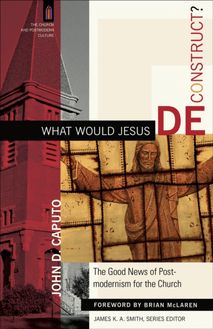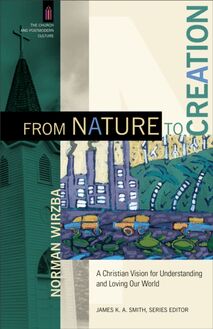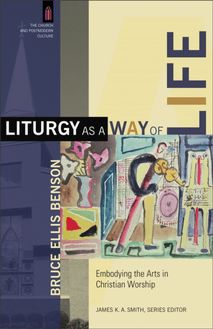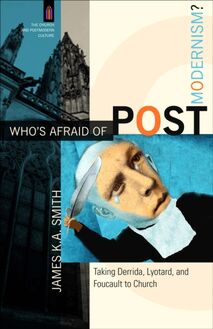Liturgy as a Way of Life (The Church and Postmodern Culture) , livre ebook
102
pages
English
Ebooks
2013
Vous pourrez modifier la taille du texte de cet ouvrage
Obtenez un accès à la bibliothèque pour le consulter en ligne En savoir plus
Découvre YouScribe et accède à tout notre catalogue !
Découvre YouScribe et accède à tout notre catalogue !
102
pages
English
Ebooks
2013
Vous pourrez modifier la taille du texte de cet ouvrage
Obtenez un accès à la bibliothèque pour le consulter en ligne En savoir plus
Publié par
Date de parution
15 avril 2013
Nombre de lectures
0
EAN13
9781441240521
Langue
English
Also available in the series
Merold Westphal, Whose Community? Which Interpretation? Philosphical Hermeneutics for the Church
James K. A. Smith, Who’s Afraid of Postmodernism? Taking Derrida, Lyotard, and Foucault to Church
John D. Caputo, What Would Jesus Deconstruct? The Good News of Postmodernism for the Church
Carl Raschke, GloboChrist: The Great Commission Takes a Postmodern Turn
Graham Ward, The Politics of Discipleship: Becoming Postmaterial Citizens
Daniel M. Bell Jr., The Economy of Desire: Christianity and Capitalism in a Postmodern World
© 2013 by Bruce Ellis Benson
Published by Baker Academic
a division of Baker Publishing Group
P.O. Box 6287, Grand Rapids, MI 49516-6287
www.bakeracademic.com
Ebook edition created 2013
All rights reserved. No part of this publication may be reproduced, stored in a retrieval system, or transmitted in any form or by any means for example, electronic, photocopy, recording without the prior written permission of the publisher. The only exception is brief quotations in printed reviews.
ISBN 978-1-4412-4052-1
Library of Congress Cataloging-in-Publication Data is on file at the Library of Congress, Washington, DC.
Unless otherwise indicated, Scripture quotations are from the New Revised Standard Version of the Bible, copyright © 1989, by the Division of Christian Education of the National Council of the Churches of Christ in the United States of America. Used by permission. All rights reserved.
Scripture quotations labeled RSV are from the Revised Standard Version of the Bible, copyright 1952 [2nd edition, 1971] by the Division of Christian Education of the National Council of the Churches of Christ in the United States of America. Used by permission. All rights reserved.
Scripture quotations labeled KJV are from the King James Version of the Bible.
The internet addresses, email addresses, and phone numbers in this book are accurate at the time of publication. They are provided as a resource. Baker Publishing Group does not endorse them or vouch for their content or permanence.
Contents
Cover 1
Series Page 2
Title Page 3
Copyright Page 4
Series Preface 7
Series Editor’s Foreword 9
Preface 13
Introduction: The Art of Living 19
1. The Call and the Response 33
2. Deconstructing the Discourse of Art 49
3. Improvising like Jazz 71
4. On Not Being an Artistic Whore 99
5. Becoming Living Works of Art 127
Notes 157
Index 161
Back Cover 163
Series Preface
Current discussions in the church from emergent “postmodern” congregations to mainline “missional” congregations are increasingly grappling with philosophical and theoretical questions related to postmodernity. In fact, it could be argued that developments in postmodern theory (especially questions of “post-foundationalist” epistemologies) have contributed to the breakdown of former barriers between evangelical, mainline, and Catholic faith communities. Postliberalism a related “effect” of postmodernism has engendered a new, confessional ecumenism wherein we find nondenominational evangelical congregations, mainline Protestant churches, and Catholic parishes all wrestling with the challenges of postmodernism and drawing on the culture of postmodernity as an opportunity for rethinking the shape of our churches.
This context presents an exciting opportunity for contemporary philosophy and critical theory to “hit the ground,” so to speak, by allowing high-level work in postmodern theory to serve the church’s practice including all the kinds of congregations and communions noted above. The goal of this series is to bring together high-profile theorists in continental philosophy and contemporary theology to write for a broad, nonspecialist audience interested in the impact of postmodern theory on the faith and practice of the church. Each book in the series will, from different angles and with different questions, undertake to answer questions such as, What does postmodern theory have to say about the shape of the church? How should concrete, in-the-pew and on-the-ground religious practices be impacted by postmodernism? What should the church look like in postmodernity? What has Paris to do with Jerusalem?
The series is ecumenical not only with respect to its ecclesial destinations but also with respect to the facets of continental philosophy and theory that are represented. A wide variety of theoretical commitments will be included, ranging from deconstruction to Radical Orthodoxy, including voices from Badiou to Žižek and the usual suspects in between (Nietzsche, Heidegger, Levinas, Derrida, Foucault, Irigaray, Rorty, and others). Insofar as postmodernism occasions a retrieval of ancient sources, these contemporary sources will be brought into dialogue with Augustine, Irenaeus, Aquinas, and other resources. Drawing on the wisdom of established scholars in the field, the series will provide accessible introductions to postmodern thought with the specific aim of exploring its impact on ecclesial practice. The books are offered, one might say, as French lessons for the church.
Series Editor’s Foreword
J AMES K. A. S MITH
When philosophers and theologians engage postmodernism, they tend to spend their time debating arcane matters of epistemology, hermeneutics, and metanarratives. Meanwhile, a kind of “practical” postmodernism has emerged in the contemporary church in other, more tangible ways. One can read the renewal of the arts in the church including new concerns about the arts in worship as evidence that Christianity’s complicity with modernity might be waning, at least in some respects.
Over the past couple of centuries, the church’s worship perhaps especially in Protestant evangelicalism unwittingly mimicked the rationalism (and dualism) of modernity. Assuming with Descartes that humans are primarily “thinking things,” worship has been centered on didactic teaching. A few songs merely function as a preface to a long sermon, the goal of which is the dissemination of information to brains-on-a-stick, sitting on their hands. The body has no role in such worship; it is worship for the proverbial brains-in-a-vat of philosophical fame. And because the body has no essential role in such worship, there is also no place for the arts, which are inherently sensible, even sensual. One can sense this in the pragmatism of church architecture, or the stark minimalism of interior design in Protestant churches, where the only adornment was often scriptural texts emblazoned on the walls. In rationalist worship spaces, even the wallpaper is didactic.
Such “rationalist” worship also tends to not have any real place for the Eucharist. Indeed, I think one can generally note a correlation between the centrality of the Eucharist in worship and an appreciation for the materiality that underwrites the arts. So what’s lost in modernity and our unwitting adoption of rationalism is just the sort of sacramentality that undergirds Christian affirmation of the body the same sensibility that values the arts. The metaphysics of modernity flattens the world, reducing human persons to information processors. [1] And if we buy into this, we will “worship” accordingly. The didactic will trump the affective; the intellect will crowd out the imagination; the body will be present as only a vehicle to get the mind in the pew. Welcome to the cathedral of Descartes.
But just as evangelicals are rediscovering the sacramental imagination that is carried in the liturgical tradition, they are also beginning to appreciate the importance of the arts in culture and in worship. Both of these trends, I would suggest, are the fruit of our discomfort with the rationalist model and testify to its implosion. As such, both developments are also a kind of postmodern critique in practice . To appreciate the arts is to appreciate that we are more than thinking things. To recover the arts is to remember that we have bodies which is to remember what Christians knew well before modernity. So we are now seeing an explosion of centers, institutes, conferences, and books devoted to “arts and worship.” More and more congregations are intentionally incorporating the arts into worship including a range of forms, from visual art to liturgical dance, on top of an explosion of new music. Granted, much of this might simply function as ornamentation of a model that is still largely didactic and rationalist. But there is an intuition at work here that unsettles our modern habits.
So there is good reason to celebrate and affirm this newfound interest in the arts, particularly for those of us who have seen postmodernism as a kind of demodernizing discipline to help the church awake from its modern slumbers, thereby opened to recover the ancient treasury of the church’s formative practices. This is what Robert Webber described as an “ancient-future” sensibility: resources for a postmodern future found in the buried treasures of an ancient heritage.
In this book, Bruce Ellis Benson shares the same intuition about a link between liturgy and the arts (and vice versa). So one could hope that a new appreciation for the arts in the church might be a kind of sacramental “gateway drug” that draws congregations to liturgical renewal. Conversely, one could hope that those congregations that are intentionally recovering the rich panoply of the church’s liturgical practices might thereby consider how the arts are characterized by the same affective imaginativity.
However, while a renewal of the arts can be read as a “practical postmodernism,” we also need to be cautious. For the new emphasis on art, creativity, and imagination could just as easily be simply another modernism a recovery of modern romanticism, even if that might be an implicit critique of Enlightenment rationalism. As Benson argues, romantic conceptions of art are still characterized by the hallmarks of modernity, particularly its atomism and emphasis on autonomy. The romantic notion of artistic creati









